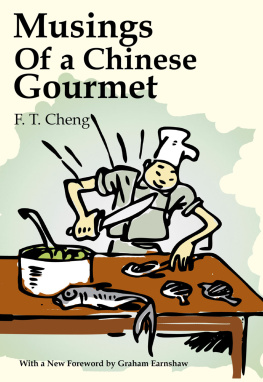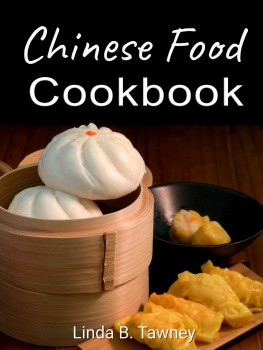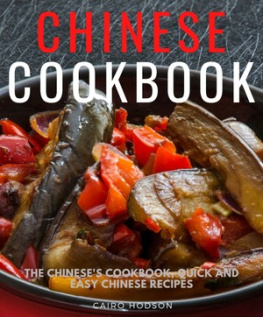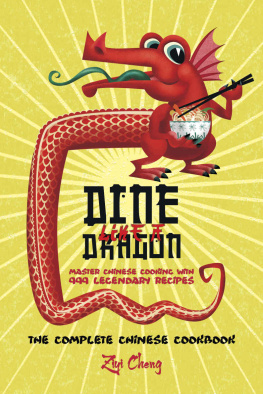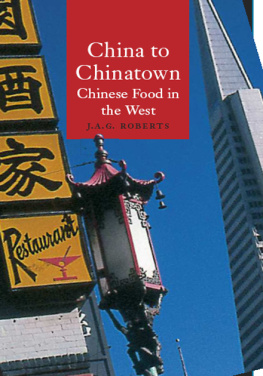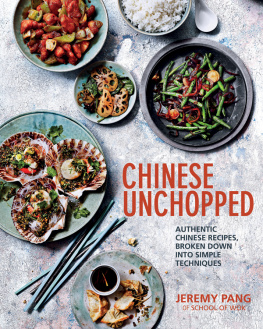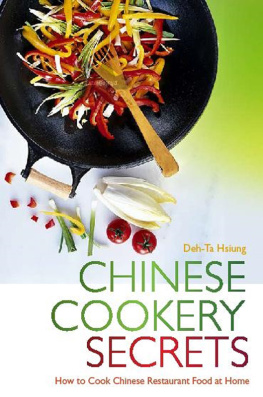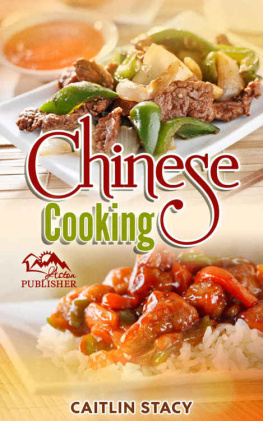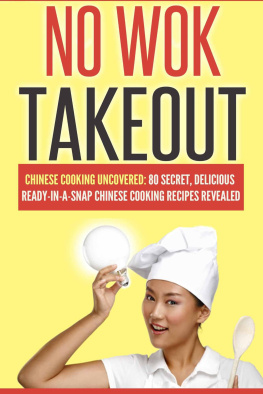Musings Of A Chinese Gourmet
By F. T. Cheng
With a new foreword by Graham Earnshaw
ISBN-13: 978-988-17326-0-6
2008 Earnshaw Books
Musings Of A Chinese Gourmet was first published in 1954.
Series Editor: Andrew Chubb
HISTORY / Asia / China
First printing April 2008
Second printing August 2009
EB008
Spellings and punctuations are left as in the original edition.
All rights reserved. No part of this book may be reproduced in material form, by any means, whether graphic, electronic, mechanical or other, including photocopying or information storage, in whole or in part. May not be used to prepare other publications without written permission from the publisher except in the case of brief quotations embodied in critical articles or reviews. For information contact
Published by Earnshaw Books Ltd. (Hong Kong)
To the Ruler the people is Heaven;
to the people food is Heaven
Kwan Tze
No one does not eat and drink;
but few can appreciate (the nicety of) taste.
Confucius
BY THE SAME AUTHOR
Rules of Private International Law Determining Capacity to Contract. (Stevens & Sons, London)
Laws of China. (Contributed to The Lawyers Directory, Cincinnati, Ohio)
Civilization and Art of China (William Clowes & Sons, London)
China Moulded by Confucius (Stevens & Sons)
East and West (Hutchinson & Co., London)
Barrister-at-Law, Honorary Bencher of Middle Temple, Fellow of University College, London, Member of Permanent Court of Arbitration, Member of Panel for Inquiry and Conciliation of the United Nations, Formerly, Ambassador to the Court of St. Jamess, Judge of Permanent Court of International Justice, Special Commissioner of Chinese Government for the International Exhibition of Chinese Art in London in 1935, Vice-Minister and Acting Minister of Justice, Nanking, Judge of Supreme Court, Peking, etc., etc.
TO
MY FRIEND
Mr. K. C. Li
Contents
Foreword
By Graham Earnshaw
THIS book was written at the end of an erathe half-way point of the 20th century when the communists occupied the whole of the China mainland, the Nationalists fled to Taiwan, and the curtain started to come down on a whole way of lifethe urbane, bourgeois, sophisticated life of Chinas old elite. The communist leaders, led by Mao Tse-tung, were mostly peasants and they not only despised the effete culture of the old Mandarin class, they also saw it as a serious threat to their rule in the New China. They worked to destroy it, and in the Cultural Revolution of the mid-1960s, the culture of aristocratic old China was snuffed out entirely on the mainland.
It was a shame, because while there was corruption, arrogance, waste, decadence and sloth in the world of the Mandarins of old China and their successors, the Nationalist elite of the early 20th century in their Western suits and cheongsams, there was also much of value, including a food and alcohol culture that over centuries and even thousands of years had been refined to the most extraordinary detail.
That culture survived in a form in Taiwan and to some extent in Hong Kong through the decades that followed the communist takeover, but the mainland was for many long years reduced to bowls of rice and noodles and little else. In 1978, when I came to the mainland, the streets of even the largest cities were almost as dark as a tomb, and the number of restaurants in Shanghai and Beijing could be counted on one hand. It is almost unbelievable to remember it when looking at the neon-lit multi-level food palaces that now abound in all Chinas cities.
F.T. Cheng, the author of this book, was definitely a member of that old Chinese elite whose world was shattered by the communist victory. At the moment when the world ended, in 1949, he was the Chinese ambassador to the Court of St. James, in other words, to the United Kingdom in London. He dined occasionally with Princess Elizabeth, soon to be queen, and her husband Prince Philip. He was an intellectual who spoke English with the same old world charm as he no doubt did Chinese. And once things stabilized in the early 1950swith Britain at that point still recognizing the government in Taipei as the rightful government of all Chinahe decided to write his musings on the theme of Chinese food and drink.
He published this book in 1954, and incredibly there is absolutely no mention of the recent spot of trouble that had barred him from ever returning to mainland China. He had anyway spent more than two decades living in London and New York, and he would probably have been somewhat unhappy to be thrown back into the messiness of the reality of Chinese life.
Mr Cheng was certainly a gourmet, and this book is a collection of what would no doubt have been long and entertaining dinnertime monologues as his guests sat at a round table in his residence or at one of the best Chinese restaurants in London and New York, and listened to his articulate, learned dissertations on such topics as how to prepare sharks fin soup, how to brew the perfect cup of Chinese tea, and how to judge a good Chinese rice wine.
Of course, the food, the tea, the drinks would all have been prepared and delivered by an army of cooks, maids and servants who hover in the shadows of this delightful work.
Mr Chengit would be impolite and inappropriate not to address him as Mr at all referenceswas Cantonese and a great fan of that great southern school of Chinese cooking. He gives precise recipes for many of the key dishes, and very detailed directions on how to prepare them. These recipes have a value, and people who know about Chinese cooking will enjoy comparing the recipes and preparation approach of Chinese cuisine in the early decades of the 20th century. But of even greater value, I think, are his musings on life and the Chinese character that spring out of his gourmet mental ramblings.
He quotes liberally from, or rather sprinkles his text generously with, quotations from the Chinese classics and from the literature of England. Shakespeare, Bacon (how apt), and Milton are all referred to along with many others. Mr Cheng, who also quotes from his own poems, is clearly at pains to demonstrate to the fullest that he is more educated in English than all but a small number of Englishmen, the aim being not only to show off, but also to establish his credentials for pontificating at such length about the culture of China.
Food, says Mr Cheng, is not just a necessary activity to stay alive, it should also be an integral part of culture. Chinese cooking is both a science and an art. Unlike most books which point to China having invented paper and gunpowder, he talks instead of how China invented soy sauce. He explores the regional schoolsSichuan, Canton, Shanghai, Beijing and beyond. He tells anecdotes which are charming and sometimes dismissive of the fairer sex. He waxes lyrical on tea preparation and the table games that accompany wine drinking after the food has been cleared away by the butler and his staff.
We can be reasonably sure he would not have been impressed by todays Chinese supermarkets, with their shrink-wrapped chicken feet, pre-cooked dumplings and surly assistants. He talks with Confucian approval of how, in his day, [a] shop assistant or cook performs his duties cheerfully with a high sense of dignity and equality.
The alcohol culture of China is something that is particularly of interest to me, not because I am heavy drinkerI am notbut because it really does seem to reflect the depth and cultural significance that Mr Cheng ascribes to the whole Chinese process of ingesting matter.
In Western drinking, the drinkers may clink glasses at the start of the session and say cheers. But after that, they basically all drink alone, taking a sip or a gulp of the liquid whenever the fancy takes them and with no regard to what other members of the group are doing.
Next page
